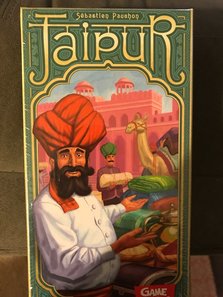 This summer is a time of transition for me as I prepare to move to a new city and teach at a new school. But the students I work with are always in a state of flux as they evolve into their best selves. I am lucky because I get to watch the process for a while, at least until they graduate. One of my favorite seniors this year, Aquilah, was a student I have known and taught for three years. It's been a privilege to watch her grow. As this school year came to an end, we had plenty of stuff to reminisce about: "Dr. D, do you remember the time I ate all of that candy back in Math I and I went soooo crazy?" (Yes, yes I do.) But what amazed me most was how many of our memories are anchored by board games. Aquilah was not one of my game club regulars. I taught her how to play Jaipur during finals week a couple of years ago because she was done testing and had gotten bored. I figured we would play a few rounds, but then she'd move on once testing was over and she could use her phone again. Instead, she surprised me: The following year, when we had lunch at the same time, she would drop by for another round of "our game." I had never thought of Jaipur that way before, but then I realized that she was right. Of all of the games of Jaipur I have played, the majority of them have been with Aquilah. During her last finals week of high school, Aquilah showed up even after she was finished with her classes and didn't technically have to be there. Why? So she could play Jaipur with me. So we played... and played, and played. Even better, she killed me in our final game, and I couldn't have been prouder. Board games may be "just for fun," but they have the power to create and deepen relationships. No matter who plays it with me in the future, Jaipur will always have a special place in my heart as "our game." It will always be able to transport me to another time and place, to when I was a new teacher navigating my first job and becoming attached to my first batch of students. I hope that the games we played conjure happy memories for my students, as well. Aquilah has since moved to another state, where she'll be starting college in the fall. But I did manage to get her new mailing address, and I'll be heading to the post office later today. What am I sending her? I'll give you three guesses. ;)
1 Comment
 Image taken from TeachHub. Image taken from TeachHub. A Google search for board games and literacy inevitably turns up information about overtly educational board games, specifically designed to teach reading skills to kids. I find this trend interesting, because my students never really like games when they are designed to be more educational than fun. Review games in class usually meet with a lukewarm reception, almost as if the material I'm trying to teach automatically taints the games with boringness. They are like little kids who know that mom is sneaking them extra veggies on pizza night. That said, I can teach my students a lot—and learn quite a bit about them—by playing games. Students who are reluctant to read will try much harder when deciphering in-game text than they would on a standardized test. When we are playing games, students will ask more questions and take more risks. To them, there is no pressure because it's "just a game." One of my favorite games to play with students when I want them to read is Sentinels of the Multiverse. The comic book theme attracts a lot of teenagers, plus the fact that it's a co-op game encourages good behavior. But in order to succeed, players must be able to read the text on a card, connect it with other cards in their deck or in the game at large, and find a way to effectively do battle against a common enemy. (Plus, if they like the game, I can direct them to the comics.) Other card games like Magic: The Gathering and even Dominion are interesting to play with students because their interpretations of card text tell you so much about what information they process and how they process it. Although I haven't played old school RPGs or visual novels with my students, and will probably never have the time to, I suspect that these games naturally promote literacy because they are compelling. Several of my early vocabulary words were picked up from video games, and I can't be the only one. I believe that games, both analog and digital, have a lot of potential as tools for literacy... as long as that is not overtly what they are about. This makes me wonder. I am a public high school teacher, and my lesson planning focuses on concrete objectives that my principal can immediately understand if he comes by for a walkthrough. I also teach at a Title 1, where there is extra pressure for teachers and students to "work bell-to-bell." But students only want to play games when they genuinely feel that they are getting to play, no strings attached. I'm still looking for that happy medium with games based on class material, where it truly feels like we are having fun.  As a teacher, I am often forced to make choices that weigh on me. Did I really give that student the help he or she needed? When a student acted out, did I successfully manage to correct the behavior while maintaining a positive relationship? As the co-sponsor of a board game club, my job becomes surprisingly difficult. The club is supposed to be fun, and it is. Every Friday afternoon, my classroom is packed with students who are excited to be at school late on a Friday. What is even better is that many of my game clubbers are the "nerds" of the school who are finally in a place where they can be themselves. The students do more than play chess or other games: They argue about comic book characters, try out weird voices at each other, and swap tips for Skyrim quests. One of the female students who attends is so quiet, so much of the time, that I was stunned (and delighted) when she realized I had a PS Vita and gushed to me about Danganronpa for half an hour. For one hour after school on Fridays, my classroom is a place of pure happiness and acceptance. I am also delighted to say that our club has more young women this year than last, and that many of them are excited to face off against the boys over a chess board. Everywhere I turn, there are more teenage girls playing Wii, joining in a game of Ivanhoe, or just working on our current jigsaw puzzle. It is awesome. Given that nerd culture is widely thought of as female-unfriendly, and that we are now watching our own politicians twist themselves in knots about whether it's okay to talk about "grabbing women by the p***y," it's of extreme importance to create environments where women are not only safe, but welcome and respected. The integration of young women into my club is also where some of my challenges as a sponsor come from: I occasionally have issues with boys who are comfortably among their friends and who want to talk to each other in sexist ways as part of their nerdy "locker room talk." We've already had conversations about not describing victory or defeat in terms of rape, and about not referring to each other as "b****." But interventions are not always successful. One kid just got kicked out of my room for a week for saying that a boy he was arguing with was "on his period," then doubling down when I asked him to stop by saying that the other kid "forgot his tampons." He is about to get his ban extended because he keeps coming to me to argue that his comments were not offensive. It's infuriating. Most of the boys who persistently engage in nerd macho talk are themselves insecure. They are searching for a place where they can feel comfortable in their own identities. As their teacher and mentor, I don't want them to feel rejected or ostracized. But it is also my duty as an educator to protect young women who never deserve to be spoken about in ways that perpetuate the idea that they are inferior to men or that their bodies are up for discussion by men. For now, my solution is to call out sexist comments when I hear them, and to temporarily ban repeat offenders. (Kids should always have another chance to come back and prove that their behavior has changed.) My male co-sponsor and I have both had meaningful conversations with students about how to treat other people. But I don't always know how to permanently change attitudes, especially among the boys who can't seem to drop the bravado and who are more interested in impressing other boys than in impressing their teacher. Sometimes I feel torn about it, because those boys are often the ones who need acceptance and support the most. But here's the bottom line: I can't grant that acceptance (or let them try to earn it from their peers) at the expense of other students—especially female students who are just starting to embrace their own nerdy identities. Students who trust that my game club is a place where they are always welcome. Maybe the actions that I take will have an impact a while from now, when I'm not around to see. Or maybe if other teachers, mentors, game group leaders, and friends all send the same message that I'm sending, we can collectively help nerd culture to change. I can't do it all on my own. So if any of you, readers, are in a position to call out sexism (or other prejudice) in your gaming club or group, it's your moral obligation to do so. If you don't, what attitudes and behaviors are you validating? 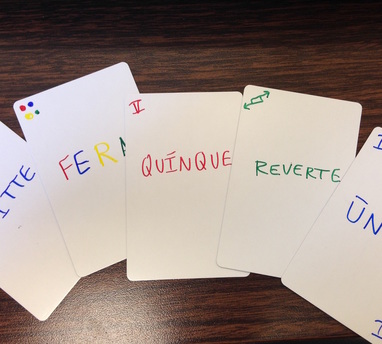 Even before I can convince them to play those "weird," "nerdy" board games, most of the students in my classes will play Uno. In fact, they love it, and will play it whenever they have a chance. One of my favorite things to do as a teacher is take things my students already enjoy and make them work in a classroom context. This week, Uno gave me a great chance to experiment. I'm teaching two Latin I classes this semester, and numbers are a standard part of the curriculum. So I bought some blank cards on Amazon, borrowed a fellow teacher's colorful sharpies, and went to town. I recreated an entire Uno deck using Roman numerals, the Latin names for numbers, and the Latin for "wild," "reverse," "skip," "take two," and "take four." There is no Roman numeral for zero, so I had to improvise a bit there, but "nulla" (none) is a useful vocab word, too. Although the students technically didn't learn 1–10 (I–X?) until today, they were already primed for numbers because I let them play Latin Uno, which I'm calling Unus, last week. They recognized most of the names and numerals immediately, and actually said it was because they had played Unus. Even better, they tried it without hesitation because it's exactly like the game they already know and love. I am hoping that I can continue to use games throughout the semester to help my students internalize vocabulary words in a deeper, more meaningful way. Flash cards can be helpful and all, but they don't guarantee actual language acquisition. I guarantee you that my students will at least know the Latin numbers, one through nine, by the end of this semester! This early success has me thinking about several more possibilities, including turning Lunch Money into a gladiator fight game with the Latin words for various attacks and weapons. I could even include messed up ancient art and creepy Latin quotes. Learning is fun... until your friend brutally defeats you in the arena!  Our school year has officially begun, and soon, our board game club will be meeting again! I am not ashamed to say that the best part of my job is playing games with students. I am always trying to push the kiddos beyond much-beloved classics like Uno, Jenga, and Connect Four. Learning through play is real, and I want my students to push themselves both in class and during game time. I've ordered some games for the new school year to try out with the kids, and I cannot wait for them to arrive in the mail: 1. Paperback (2–5 Players) As both a word game and a deck-building game, Paperback is going to be board game crack for me. (That's right, students, this is how we teachers "turn up" on the weekends!) In Paperback, your goal is to write cheesy pulp novels, and you do so by using your hand to create words, purchase additional letters, and eventually acquire victory points/publish novels. I love that the words you make in this game help you towards a larger goal and that new cards allow you to take interesting new actions on later turns. Scrabble is fun when you're in the mood to assemble words, but you can be stuck with the same crappy letters for a long time, and if you're only playing for a high score, the game can get discouraging. (Playing Scrabble with my mom can be exceptionally brutal.) Paperback eliminates a lot of these problems because in deckbuilders, you discard your whole hand at the end of a turn and start fresh. There is always something you can do to try to improve your situation. I think Paperback could help my students get in touch with their inner word nerds. 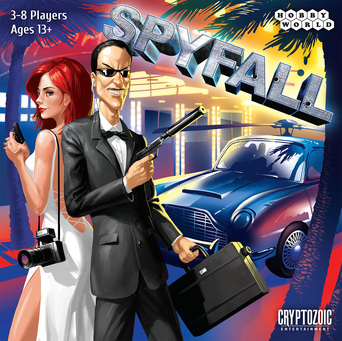 2. Spyfall (3–8 Players) Teenagers tend to use words like cudgels rather than like rapiers. And while there is a place for bluntness in life, I want to make my students' brains melt as they seek out just the right words for any occasion. Spyfall will help them practice while also having a ridiculous amount of fun. Spyfall is a social deduction game in which the players are working to detect a spy. At the beginning of the game, each player receives a card that is kept secret from the other players. Most of the players receive a card that reveals their location, for example, a casino, a pirate ship, or a movie studio. The spy, however, receives a spy card. Through a delicate process of asking and answering questions, the spy tries to work out her location, while the rest of the group tries to detect the spy. Answer a question too specifically, and the spy will easily guess where you are. But answer too vaguely, and everyone will think you're the spy! Players score points by successfully accusing and revealing a spy, while the spy scores points by revealing himself and correctly naming his location. I think the element of suspicion and the challenge of coming up with appropriately subtle questions and answers will be a lot of fun for the kids.  3. Cat Tower (3-6 Players) Cat Tower is a dexterity game that offers a fresh take on towers for anyone who has gotten tired of Jenga. In Cat Tower, each player has a hand of seven cards with cats printed on them (you can bend them to create the "legs" and stack the cats). The goal is to get rid of all of your cards first, but beware—just stacking them won't be enough. Each player also has to roll a die which causes special game effects. You may have to add "fat cats" to the tower, put cats on upside-down, or place extra cats during your turn. If you mess up and knock over part of the tower, you have to take cat cards back into your hand. Cat Tower is cute and has simple rules, but it can be challenging to stack the cats! It is also a more interesting game than Jenga, because it ends when a player runs out of cat cards—not when the tower falls. This gives everyone a chance to keep the fun going, and to get in enough practice to actually improve their gameplay. It's also great for players of all ages, because it's simple enough for kids to play but entertaining enough for a group of adults. I think it'll work well with teenagers who want something light. 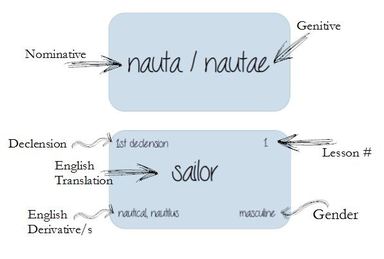 This flashcard from sixmoresummers.com makes my inner nerd sing with joy... but my students will not study it. This flashcard from sixmoresummers.com makes my inner nerd sing with joy... but my students will not study it. Summer is coming. As my teaching year comes to an end, I can't help thinking about what I want to improve for next year. This year was my first as a Latin teacher, and I started my program from scratch. As a result, I think I taught a little too traditionally this year, and there are some major changes I would like to make as I get a new crop of Latin I students. The biggest change I'd like to make is a switch to more spoken Latin/comprehensible input. I'm not ready for 100% Latin—I learned the language in the traditional grammar-heavy way—but next year I want at least one third of every class period to be conducted entirely in the Latin language. To help my students absorb vocabulary and grammar, I want to play more games with them. The mainstream classroom games we played this year—vocab bingo, Kahoot, etc.—are not what I mean by this. Overt review games can be helpful, but the kids still "know they are reviewing" and may or may not care. Instead, I would like to spend some time this summer making bootleg Latin versions of games that they already know and will play. Here are some of the ideas that I had, and I would more than welcome any suggestions in the comments: 1. Latin Clue: A Latin version of Clue with Roman names, rooms, and objects would be an awesome way to teach my students several concepts at once, without them fully realizing that I had an evil plan to teach them things. Not only would they learn the rooms of the house, but they would learn how to use specific grammatical constructions (in the room, with the object) outside of direct instruction/practice sentences. Direct instruction sometimes (...usually) does not stick. 2. Latin Guess Who: This seems like a great way for my students to "naturally pick up" information about physical appearance and the body while also internalizing the format of questions in Latin. I would obviously scaffold this by offering them vocab helps that would let them play entirely in Latin—and while playing, the students might eventually memorize the words for hat, hair (+ colors), man, woman, fat, thin, etc. without me having to do a lot of traditional drilling. 3. Latin Uno: I guarantee my students would know numbers 1–9, Roman numerals, and words for "pick up," "skip," and "reverse" in no time. 4. Any playing card game: I would love to find or make a playing card deck with Roman numerals instead of regular numbers. The face cards could be labeled rex (king), regina (queen), and eques (knight, in place of jack). With fairly minimal vocab lists, I could have the students playing games like Go Fish, Old Maid, and War. 5. Latin Apples to Apples: This game would be about vocabulary exposure. I could use our actual vocab from class with some extensions, and have two levels of the game—one with English helps on it, one without. Some of the noun cards could be historical figures or Greco-Roman gods the students had learned about, so that you could get funny pairings like "faithful" with "Jupiter." (For those whose mythology is rusty, Zeus/Jupiter was a notoriously unfaithful husband.) These games don't have to be fancy—I'm planning to get a personal laminator for about $30 on Amazon and abuse our school's color printer during teacher workdays in August. But I think that playing "real" games that just happen to be in Latin might help my students internalize and gain confidence in the language. If you have any suggestions, I am very open to hearing them! 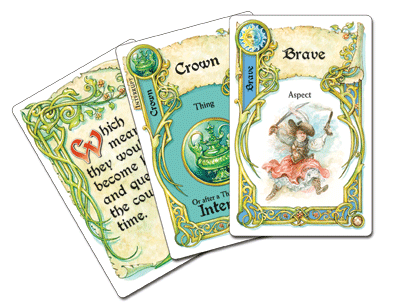 Some of the cards from Once Upon a Time (Atlas Games) Some of the cards from Once Upon a Time (Atlas Games) The high school that I teach at doesn't have the best reputation. We have low test scores and a grade of D from the state. Even though we have some award-winning teachers whose students do magnificent things, it feels like nobody every talks about the good stuff. But if you were to visit my classroom, you would immediately notice that my students are intelligent and charming. They can be rowdy, but don't let that fool you. The trick—and I still struggle with this every day—is to be engaging enough to draw their attention away from the drama of being teenagers. Unfortunately, few of my lessons are that good, because I am old and boring (I'm turning 30 in June, and to a teenager, that is ancient). My school's game club, however, always fills me with hope. One of our biggest issues school-wide is that many of our students are weak readers. Very few of my students read for pleasure, and most see reading and writing as agonizing punishments. I make my College Prep kids write a practice SAT essay every week, and they still grumble about it as though I am trying to tear off their fingernails. Despite all of the reading/writing hate, two of our biggest hits at Game Club are Once Upon A Time and Gloom. That's right. Many of my students claim to hate books, but they LOVE storytelling games! Once Upon a Time is a game in which the players tell a story together. Every player will have a starting hand of cards that contain various story elements, as well as one card with a secret individual ending. While you are narrating, you play your cards by incorporating them into the tale. If someone else is narrating and says a word that is printed on your card, you can interrupt and take over as storyteller. The ultimate goal is to play all of your cards and guide the tale towards your secret ending. In our most recent round of OUaT, we slowly revealed the saga of a fairy who lived in a well, went too deep, and ended up reaching a sewer that contained the lost city of Pooplantis. (This is what happens when you play with teenage boys, and I wouldn't have it any other way.) The absolute joy my students take in asking leading questions, in trying to interrupt each other, and in making each other laugh is priceless. Even students who are normally a bit shy about playing games enjoy OUaT, because although there is a win condition, there isn't much competitive pressure. The game truly is about having a good time telling a story together. 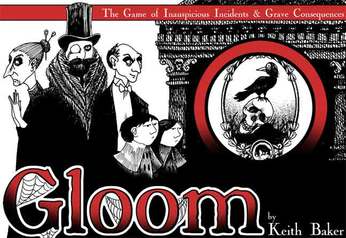 Gloom (Atlas Games) Gloom (Atlas Games) Gloom is also a particular favorite with my students, especially the ones who like to feel a little bit wicked. The object of Gloom is to take control of a family—possible members include a creepy clown, evil twins, and a "disturbing handyman"—and play status cards that make your family as miserable as possible before they die horrible deaths. You can also annoy your fellow players by making their families happy and successful. As you play the cards, you read the flavor text and tell a story about what happened. Over the course of a game, you and your friends create a communal tale of despair, and it is hilarious. What I love about Gloom is that my students know the text on the cards is going to be slightly transgressive. As a result, they will devour it, even if it contains words they aren't fully familiar with. The desire for new information drives them to take joy in reading. And both Gloom and OUaT help my students to connect with words and to pay attention to something other than a smartphone screen. When I see these things happen, I wonder: Would it be possible to extend an experience like this to a full classroom of kids? What concepts could I take from games to help my students focus and actually retain some material? I haven't fully figured out the answer yet, but I do know this: My students respond so much better to play than they do to our current system of standardized testing and endless preparation for it. They are quicker to learn strategy when engaged with a game, even if it's complicated, because they are motivated. And once I have played a game with a student, our relationship changes for the better. I think it's because we've actually had fun together and connected as people. Shouldn't school be that way more of the time, and not just on Game Club afternoons? P.S. If you would like to see footage of Once Upon a Time and Gloom in action, they have both been featured on Wil Wheaton's Tabletop. Just click the links to be taken to YouTube. 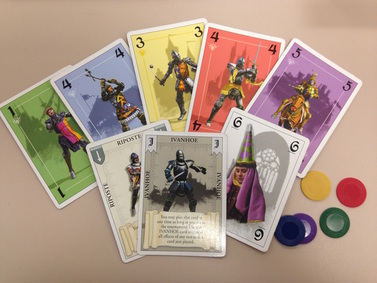 I really need that lady's hat. I really need that lady's hat. Although I do a lot of gaming--especially hardcore gaming--by myself, I also love playing with other people. Because I am a high school teacher, I play a lot of games with students. At first, when my students think of games, they usually think about Connect Four or Uno. A delightfully large number of them also love to play chess. But few of them have ventured off of the beaten path. One of the best "gateway games" I have discovered so far is Reiner Knizia's Ivanhoe. Ivanhoe is a card game in which players are knights competing in a tournament. The cards come in different colors, which represent different types of contests, from the lowly melee to the prestigious jousting match. The first player to win four types of contest (out of five) is victorious. Ivanhoe is a blast because while the premise is simple, the special cards and strategies enable more complicated maneuvering. Nothing is more satisfying than destroying all of someone's purple cards with "Break Lance," or preventing them from doing the same to you by putting down a well-timed "Ivanhoe." My students love the game so much that other teachers have overheard them arguing about who will win next time we play. Sometimes, students who have barely talked to me will suddenly open up over a round of Ivanhoe, and it changes my relationship with them forever. At the end of the semester, my classroom becomes a hub of activity for students who have already finished their finals and need something constructive to do. When that happens, Ivanhoe becomes the most in-demand game in my collection. I also have a soft spot in my heart for Ivanhoe because it was my high school gateway game. My European History/Model UN teacher had a copy and would let us break it out during downtime. It was the first game I ever really loved. Playing games in his class also exposed me to Axis & Allies, a more complicated strategy game. Although I took a hiatus from gaming during my college years, my experiences in high school primed me to fall in love with Settlers of Catan and Ticket to Ride when I first tried them at a grad student party. When my boyfriend tracked down Ivanhoe for me for Christmas, it was one of the best gifts he could have given me. Not only did I get to experience a rush of nostalgia as I unwrapped one of my favorite childhood games, but I've now had a chance to share Ivanhoe with a new generation of kids. Maybe, fifteen years from now, my own students will still remember playing Ivanhoe with me. |
AuthorMy name is Liz Davidson, and I play solo board games. A lot of solo board games... Archives
August 2021
Categories
All
|
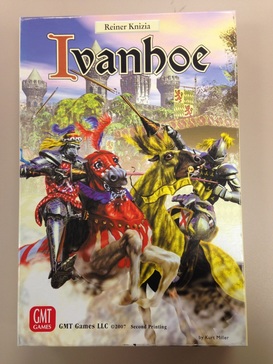
 RSS Feed
RSS Feed